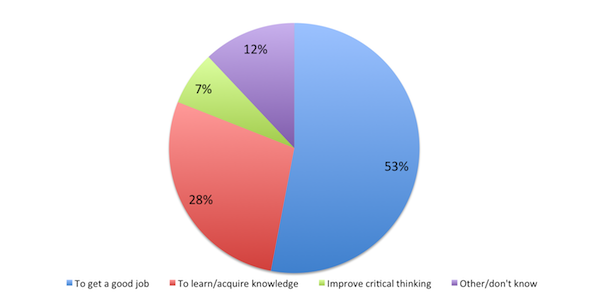Not surprisingly, a few of our readers have been pushing back on the series this week. Mainly, they’re skeptical that universities, in fact, have any responsibility where is employment is concerned.
One line of argument is that students, themselves, are not in fact that concerned with employment. Exhibit #1 for this view is usually the well-known factoid that although 80% of students say they are at university to improve their employment prospects, a similar percentage say they are there because the subject they study holds real intellectual interest for them.
That’s all well and good, but trying push a little more on that question. Ask students, if they had to pick the most important reason for attending, what would it be? We did that with 1279 respondents of our CanEd student panel, and here’s what came back:
What is Your Primary Purpose for Attending University?

And whatever students think on this subject goes double for government. The main rationale for public subsidies to higher education is that it imparts skills that deliver significant public and private returns on investment.
(That’s not to say there aren’t other purposes for higher education, of course. They just aren’t the reasons it gets subsidized. If universities tried to rely on arguments like “being places of thought and culture,” they’d get funded like symphonies and operas – i.e., poorly.)
A second line of argument is basically: “well, we profs aren’t trained for that.” True enough, but really, whose fault is that?
It’s not as though there aren’t well-established ways of linking even highly academic subjects with the labour market. The Royal College’s CanMEDS program, has managed to infuse the curricula and evaluation structures of all the main specialist physician programs with exactly the kind of workplace-driven skills (communication, teamwork, etc.) that students and employers think young people need in the labour market. If highly content-oriented programs such as neurology and internal medicine can do this, why can’t arts faculties manage the same? Or why can’t they draw on some of the principles of Europe’s Tuning Process to engage with employers about desired labour-market outcomes in non-professional programs?
You don’t have to go over to the “higher education is a bubble” camp to think that it could do a lot better by its students, and you don’t need to junk existing curricula to make important changes. What you do need to do, though, is to actually pay attention to curriculum and assessment and make sure it promotes these goals in a coherent way.
The root problem, I submit, is therefore not that we don’t like changing the curricula; it’s that we have a hard time with the idea of curriculum, full stop. More on that tomorrow.

 Tweet this post
Tweet this post

Tthose of us working in the area of co-operative and work-integrated education couldn’t agree more. At the University of Victoria we have developed curricular resources that explicate what students are learning, and the competencies they are gaining in all of our academic programs and how this can link with the workplace. We have mapped ten core competencies, the discipline specific competencies for all departments (from philosophy to engineering) and cross-cultural cpmetencies for those wanting to be effective in cross-cultural settings. Check out these resources in our “competency kit”:
http://www.uvic.ca/coopandcareer/studentsalumni/resources/competencykit/
Norah McRae
Executive Director
Co-operative Education and Career Services, UVic
Ontario colleges are pulling in university grads to post grad certificate programs, and getting them into internships and often decent first jobs. So keep up the culture of intellectual pursuit at universities and sent grads our way, the colleges are booming even without decent govt funding.